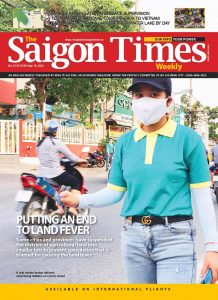Some cities and provinces have suspended the division of agricultural land into smaller lots to prevent speculation which is blamed for the land fever. Despite skepticism on the part of authorities, property investors are still inclined to divide land into small lots for sale. Why has the trend attracted new investors? How can this issue be completely resolved?
Preference for land lots and tube houses
In Vietnam, residents prefer landed houses to apartments. Besides picking private living spaces, many people think they can own land if they buy landed houses, unlike apartments. Therefore, the demand for tube houses in busy areas is growing.
Under the prevailing regulations, the land-use certificates and the certificates of ownership of homes and other land-attached assets will also be issued to owners of apartments. However, with the land use and home ownership certificates for apartments, the land may be used for a limited term (50 years and probably extended) or long term. Many people are vague about this important difference in projects, in addition to the quality and location of projects.
The demand for land lots and tube houses is higher than the need for apartments as owners can build their own houses within the framework of the law. For example, some people can use the land for living spaces or to build floors, while others may put aside part of the land for pathways or gardens.
The necessity to change thinking and regulations
From the experience of other countries, the split of land into smaller lots and the construction of tube houses will harm the planning of urban and living spaces. Some cities in the world have paid dearly as they have to spend a lot on upgrading and changing their urban planning and terminating tube houses as the development of tube houses will result in a shortage of green spaces and difficulties in ensuring safety in case of fires or emergencies.
Living in private houses is a legitimate demand, but private houses must meet the localities’ general planning and safety requirements. For example, each private house in France must have a garden, even though it is small, and there must be fences between two adjacent houses.
Private houses are extremely scarce in the downtown area unless they were developed years ago.
New urban areas will combine garden houses and apartment buildings with a maximum of three to four floors each. Infrastructure must be developed in advance for these projects. Accordingly, investors must complete electricity, gas and clean water supply and wastewater treatment infrastructure, while localities, where these projects are developed, must ensure sufficient kindergartens and primary schools.
The demand for houses in large and developing cities is constantly increasing. Due to the limited availability of land, modern apartment buildings are the most feasible solution. In France, if a family owns a house on a large land lot and cannot split the land into smaller lots and share them with their children, they will have to sell the land lot and their children will use the money to buy smaller houses or apartments. Some property developers have gradually bought large houses in cities to develop apartment buildings, but with a maximum of four floors.
Regulations on the land split for housing development should be stricter and the violators of these regulations should receive heavy sanctions.
Construction licenses should not be issued for projects failing to meet electricity and clean water supply requirements, wastewater treatment, and schools. Without the construction licenses, the value of land lots will fall.

Preventing transactions causing land fever
Land fever in areas with an unclear demand has mainly been aimed at property speculation and price manipulation. Many people listen to rumors about planning or industrial park development to take advantage of investors’ expectations. In some cases, such as stock price manipulation, a group of people will buy and sell land lots to each other to create new prices for the land lots and the last buyer will suffer the largest losses.
To prevent transactions creating land fever, high taxes should be imposed on assets with ownership or use rights being transferred repeatedly within a short period, but prices should be raised significantly. Moreover, the assets’ prices must be appraised according to market prices.
Instead of controlling the land split closely, as many land split cases are reasonable and legitimate, high taxes should be levied on transactions of real estate products conducted within one-two years after another transaction to reduce the land speculation.
It is also important to publicize the duration of the rights to use land lots on which apartment buildings are developed so that residents can understand the benefits of the assets they will invest in. In small cities and provinces, low-rise apartment buildings that are in harmony with the planning and the surrounding environment should be prioritized.
When residents can’t afford spacious private houses and comfortable apartments with good planning and reasonable prices, the demand for land lots will fall. Investors will also consider investing in land lots. If the demand for houses for living is unrealistic and land lots are traded between investors, investors involved in the transactions later will suffer losses.









